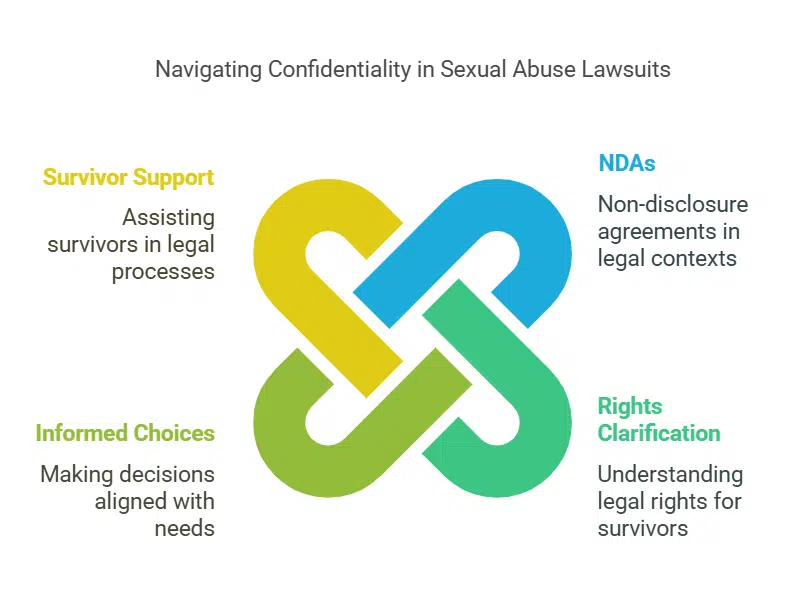In Maryland, sexual violence remains a significant concern. The state has the third highest lifetime prevalence of sexual violence other than rape among women, affecting approximately 1,248,000 individuals, or about 54.9% of the female population. Additionally, Maryland ranks sixth nationally for the lifetime prevalence of rape, physical violence, and/or stalking by an intimate partner, impacting an estimated 957,000 women, or 42% of the state’s female residents.
Confidentiality is critical for survivors pursuing legal action. A sexual abuse lawyer in Baltimore can ensure that sensitive information is handled with the utmost discretion throughout the legal proceedings. Maintaining confidentiality protects the survivor’s privacy and encourages others to come forward, knowing their personal details will be safeguarded. Legal professionals are adept at navigating the complexities of sexual abuse cases while prioritizing the survivor’s need for privacy, thereby fostering a sense of security and trust during a challenging time.
Exploring the Concept of Confidentiality Contracts
Nondisclosure Agreements (NDAs), commonly known as confidentiality agreements, are implemented to safeguard information. In sexual abuse lawsuits, these agreements keep the case details confidential, thus protecting the privacy of the individuals involved. This added layer of security aims to create a space for survivors to engage in legal processes without fearing public exposure.
The Significance of Those Who Survive the Trauma
Many survivors may hesitate to pursue justice because they fear being exposed. Confidentiality enables individuals to retain ownership of their stories and empowers them to speak about their ordeals on their terms. By safeguarding privacy through agreements, the concerns of stigma, shame, and reprisal are lessened, making it more likely for survivors to come forward.
The Legal Obstacles
Confidentiality agreements offer protection. This can lead to legal issues as well. It can be tricky to find the balance between transparency and privacy rights when courts need to protect data while ensuring accountability. Some people believe that NDAs might protect those who have been harmed, which could make it harder to seek justice and keep old patterns going. Therefore it’s important to find a ground that respects both survivor privacy and the public’s right to know.
Making Sure that Settlements Are Fair
Cases involving sexual abuse allegations and settlements commonly involve confidentiality agreements as part of the resolution process to safeguard the reputations of all parties and uphold the legal system’s integrity. Fair settlements necessitate discussions to guarantee survivors are fairly compensated while upholding their privacy rights. Attorneys play a key role in securing settlements prioritizing both financial compensation and confidentiality.
The Importance of Having a Lawyer
Legal advice plays an important role in helping individuals navigate the aspects of confidentiality in sexual abuse lawsuits. Lawyers offer assistance in clarifying the effects of NDAs and help survivors understand their rights and available courses of action. By providing expert guidance and counsel, legal professionals enable individuals to make informed choices ensuring that confidentiality agreements align with their needs and objectives.
Difficulties In Implementation
Ensuring confidentiality agreements are upheld comes with a set of difficulties that need to be handled, as breaches can happen unexpectedly and may unintentionally harm those involved. Legal channels are in place to deal with breaches. However, resolving them can be time-consuming. It is crucial to have solid law enforcement practices in place to safeguard the integrity of confidentiality agreements and uphold the rights of all parties involved.
The Importance of Interest and Transparency
Maintaining an equilibrium between preserving confidentiality and upholding legal interests continues to be debated. Highlighting the significance of transparency in instances of abuse is crucial as it draws attention to serious problems and encourages accountability. Nonetheless, excessive public disclosure may discourage survivors from sharing their stories hindering the efforts to tackle abuse effectively. Finding the harmony between respecting privacy and raising public consciousness requires thoughtful deliberation and cooperation among legal professionals, advocates, and policymakers.
The Effects on Recovery for Survivors of Sexual Abuse
Confidentiality plays a key role in helping survivors heal by offering a supportive environment during legal processes. These agreements permit individuals to concentrate on their recovery without the stress of public scrutiny weighing them down. Preserving privacy empowers survivors with a sense of agency to better navigate their healing journey. Recognizing the advantages of confidentiality highlights its contribution to promoting survivors’ holistic welfare.
Future Considerations In This Area
The changes in laws could impact how confidentiality is handled in cases of sexual abuse incidents as societal views evolve and people become more aware of the issue. This may prompt a review of existing procedures. Also, ongoing conversations involving legal experts, survivors, and supporters will influence how confidentiality arrangements are tailored to benefit all parties involved.
Takeaways
Confidentiality is crucial in sexual abuse cases as it provides a sense of security and strength to those affected by such incidents. It’s important to find a balance between maintaining privacy and ensuring openness to allow victims to seek justice without worrying about their information being shared publicly. By discussing and adjusting guidelines consistently, confidentiality agreements can be instrumental in assisting survivors and encouraging legal responsibility.





































